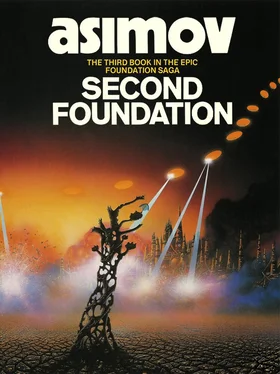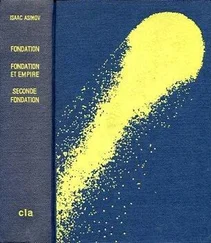And what had most changed was his early concern over the Second Foundation. He laughed at the thought of that: and pictured in luxuriant detail the final revelation to Dr. Darell, to that energetic, young competent, Anthor, to all of them—
He knew. He, Homir Munn, finally knew the truth.
The final two months of the Kalganian war did not lag for Homir. In his unusual office as Mediator Extraordinary, he found himself the center of interstellar affairs, a role he could not help but find pleasing.
There were no further major battles—a few accidental skirmishes that could scarcely count—and the terms of the treaty were hammered out with little necessity for concessions on the part of the Foundation. Stettin retained his office, but scarcely anything else. His navy was dismantled; his possessions outside the home system itself made autonomous and allowed to vote for return to previous status, full independence or confederation within the Foundation, as they chose.
The war was formally ended on an asteroid in Terminus’ own stellar system; site of the Foundation’s oldest naval base. Lev Meirus signed for Kalgan, and Homir was an interested spectator.
Throughout all that period he did not see Dr. Darell, nor any of the others. But it scarcely mattered. His news would keep—and, as always, he smiled at the thought.
Dr. Darell returned to Terminus some weeks after VK day, 62; 377, and that same evening, his house served as the meeting place for the five men who, ten months earlier, had laid their first plans.
They lingered over dinner and then over wine as though hesitating to return again to the old subject.
It was Jole Turbor, who, peering steadily into the purple depths of the wineglass with one eye, muttered, rather than said, “Well, Homir, you are a man of affairs now, I see. You handled matters well.”
“I?” Munn laughed loudly and joyously. For some reason, he had not stuttered in months. “I hadn’t a thing to do with it. It was Arcadia. By the by, Darell, how is she? She’s coming back from Trantor, I heard?”
“You heard correctly,” said Darell, quietly. “Her ship should dock within the week.” He looked, with veiled eyes, at the others, but there were only confused, amorphous exclamations of pleasure. Nothing else.
Turbor said, “Then it’s over, really. Who would have predicted all this last spring? Munn’s been to Kalgan and back. Arcadia’s been to Kalgan and Trantor and is coming back. We’ve had a war and won it, by Space. They tell you that the vast sweeps of history can be predicted, but doesn’t it seem conceivable that all that has just happened, with its absolute confusion to those of us who lived through it, couldn’t possibly have been predicted?”
“Nonsense,” said Anthor, acidly. “What makes you so triumphant, anyway? You talk as though we have really won a war, when actually we have won nothing but a petty brawl which has served only to distract our minds from the real enemy.”
There was an uncomfortable silence, in which only Homir Munn’s slight smile struck a discordant note.
And Anthor struck the arm of his chair with a balled and fury-filled fist, “Yes, I refer to the Second Foundation. There is no mention of it and, if I judge correctly, every effort to have no thought of it. Is it because the fallacious atmosphere of victory that palls over this world of idiots is so attractive that you feel you must participate? Turn somersaults then, handspring your way into a wall, pound one another’s back and throw confetti out the window. Do whatever you please, only get it out of your system—and when you are quite done and you are yourselves again, return and let us discuss that problem which exists now precisely as it did last spring when you sat here with eyes cocked over your shoulders for fear of you knew not what. Do you really think that the Mind-masters of the Second Foundation are less to be feared because you have beat down a foolish wielder of spaceships?”
He paused, red-faced and panting.
Munn said quietly, “Will you hear me speak now, Anthor? Or do you prefer to continue your role as ranting conspirator?”
“Have your say, Homir,” said Darell, “but let’s all of us refrain from over-picturesqueness of language. It’s a very good thing in its place, but at present, it bores me.”
Homir Munn leaned back in his armchair and carefully refilled his glass from the decanter at his elbow.
“I was sent to Kalgan,” he said, “to find out what I could from the records contained in the Mule’s palace. I spent several months doing so. I seek no credit for that accomplishment. As I have indicated, it was Arcadia whose ingenuous intermeddling obtained the entry for me. Nevertheless, the fact remains that to my original knowledge of the Mule’s life and times, which, I submit, was not small, I have added the fruits of much labor among primary evidence which has been available to no one else.
“I am, therefore, in a unique position to estimate the true danger of the Second Foundation; much more so than is our excitable friend here.”
“And,” grated Anthor, “what is your estimate of that danger?”
“Why, zero.”
A short pause, and Elvett Semic asked with an air of surprised disbelief, “You mean zero danger?”
“Certainly. Friends, there is no Second Foundation! ”
Anthor’s eyelids closed slowly and he sat there, face pale and expressionless.
Munn continued, attention-centering and loving it, “And what is more, there was never one.”
“On what,” asked Darell, “do you base this surprising conclusion?”
“I deny,” said Munn, “that it is surprising. You all know the story of the Mule’s search for the Second Foundation. But what do you know of the intensity of that search—of the single-mindedness of it? He had tremendous resources at his disposal and he spared none of them. He was single-minded—and yet he failed. No Second Foundation was found.”
“One could scarcely expect it to be found,” pointed out Turbor, restlessly. “It had means of protecting itself against inquiring minds.”
“Even when the mind that is inquiring is the Mule’s mutant mentality? I think not. But come, you do not expect me to give you the gist of fifty volumes of reports in five minutes. All of it, by the terms of the peace treaty, will be part of the Seldon Historical Museum eventually, and you will all be free to be as leisurely in your analysis as I have been. You will find his conclusion plainly stated, however, and that I have already expressed. There is not, and has never been, any Second Foundation.”
Semic interposed, “Well, what stopped the Mule, then?”
“Great Galaxy, what do you suppose stopped him? Death did; as it will stop all of us. The greatest superstition of the age is that the Mule was somehow stopped in an all-conquering career by some mysterious entities superior even to himself. It is the result of looking at everything in wrong focus.
“Certainly no one in the Galaxy can help knowing that the Mule was a freak, physical as well as mental. He died in his thirties because his ill-adjusted body could no longer struggle its creaking machinery along. For several years before his death he was an invalid. His best health was never more than an ordinary man’s feebleness. All right, then. He conquered the Galaxy and, in the ordinary course of nature, proceeded to die. It’s a wonder he proceeded as long and as well as he did. Friends, it’s down in the very clearest print. You have only to have patience. You have only to try to look at all facts in new focus.”
Darell said, thoughtfully, “Good, let us try that, Munn. It would be an interesting attempt and, if nothing else, would help oil our thoughts. These tampered men—the records of which Anthor brought to us nearly a year ago, what of them? Help us to see them in focus.”
Читать дальше
Конец ознакомительного отрывка
Купить книгу











